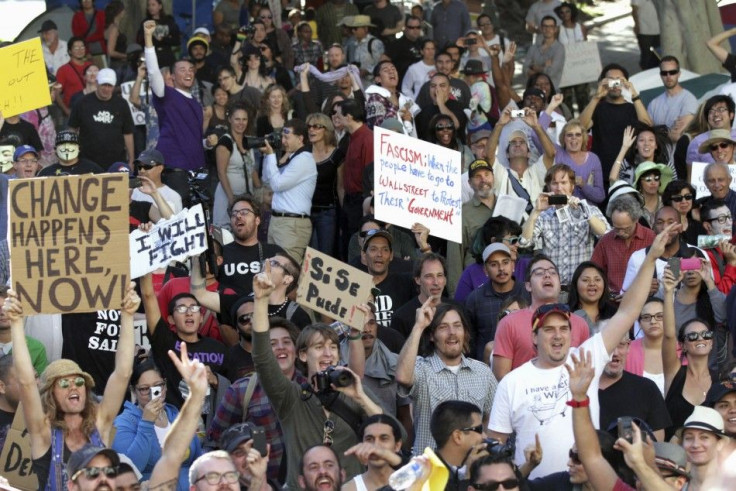Occupy Wall Street Protests: 20-Somethings' Anger Rooted in Horrible Job Market
ANALYSIS

Occupy Wall Street has been characterized -- fairly or not -- as the Tea Party for the left or Democrats.
There are some similarities between Occupy Wall Street and the Tea Party, though they are similarities that exist between most protest movements: they are angry, claim the populist mantle, shun the idea that they are arms of the two established political parties and are protesting government policies.
Some supporters of each movement may also have similar beliefs about reforming the Federal Reserve, opposing the bank bailouts, or ending the wars in Iraq and Afghanistan.
Economics, Social Justice at Core of Movement?
And where the Tea Party movement and the elected officials it produced see over-taxing, over-spending and over-regulating government as a barrier to job creation and economic recovery, Occupy Wall Street identify corporations as the impediment.
I think the entire movement is about economic justice, Jesse LaGreca, a protester and blogger for liberal website Daily Kos, said during an interview on Sunday with ABC's This Week. I mean, to me-and I'm not speaking on behalf of Occupy Wall Street, I'm just giving my personal opinion - I think it's a matter of economic rights.
But the economic situation for many young adults in the U.S. is unique.
Economically, this is a generation that is the most in debt from credit cards, as well as student debt, in history, said Matthew Segal, co-founder and president of Our Time, an advocacy group for adults under 30. It's also a generation living with their parents well into their 20s.
He said that this is a time for most young adults to focus on their career and plan for the future, instead of delaying adulthood.
Young, Educated..and Unemployed
For the Tea Party, a 2010 poll showed that the movement reflected America as a whole, in that nearly half of supporters were employed full-time and six percent were working part-time.
Nearly a quarter of Tea Party supporters were retired and six percent were unemployed. More than half-55 percent-made more than $50,000 a year.
They are also much older, as only 16 percent of 18 to 29 year olds surveyed considered themselves Tea Party supporters.
Unlike the two-year-old Tea Party, there are no major studies or polling parsing the make-up of the burgeoning Occupy Wall Street movement, which is becoming diverse as community groups and labor unions start organizing and participating in demonstrations that have spread to other cities.
For the younger set at Occupy Wall Street demonstrations, they, along with their peers throughout the country, are living through an economy with an unemployment rate higher than the nation as a whole.
The 16- to 24-year-old population is facing an 18.1 percent unemployment rate--nearly double the national 9.1 percent unemployment rate, according to the U.S. Bureau of Labor Statistics.
Unemployed 25 to 29 year olds made up 10.3 percent of the labor force in September, according to the bureau.
Even those with a college degree or more are having difficulty in this economy than educated older Americans. Young college graduates had a 9.3 percent unemployment rate, according to an April report from the Economic Policy Institute, a nonpartisan think tank.
Along with high unemployment, young adults also lack health insurance at a higher rate than the older adults. There was a slight uptick in the number of 18- to 25-year-old who said they were without health insurance since September2010, as the new health care reform law allowed young adults to stay on their parents' plans up to age 26.
Of that age group, 24.2 percent reported a lack of health insurance, down from 28 percent in September 2010. But for Americans between the ages of 26 and 64, those without health insurance have increased to 19.9 percent, from 18.1 percent around the same time last year.
Young adults are also returning home in larger numbers to live with their parents. The number of 25 to 34 year olds who live with their parents increased to 5.9 million in 2011, compared to 4.7 million before the recession, according to the U.S. Census Bureau.
Bottom Line: Young Occupiers Want Jobs
Segal of Our Time, who said he attended a New York City demonstration Sunday and criticized the notion that protesters are anti-capitalist, told IBTimes that there are young adults who joined the Occupy Wall Street protests out of desperation from a slow recovery and a sense of patriotism... young people coming together to say we can do better.
These people have exhausted their job searches, added Segal. What's left other than to go there and say, 'Look, I can't find a job.
© Copyright IBTimes 2024. All rights reserved.











